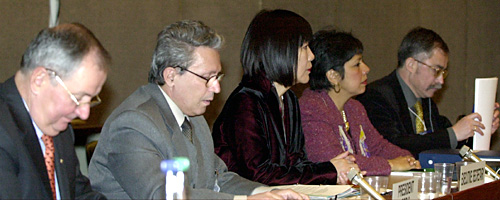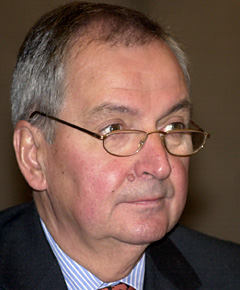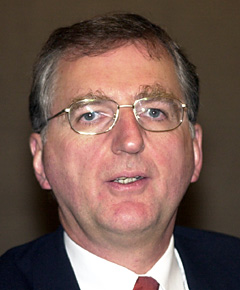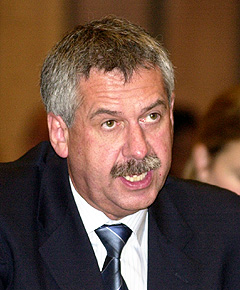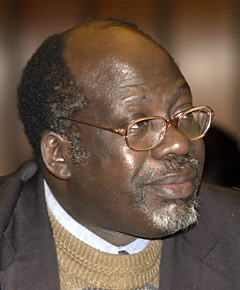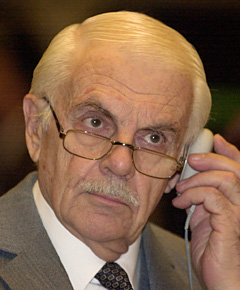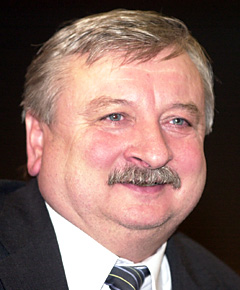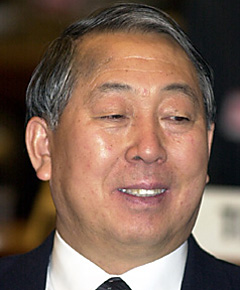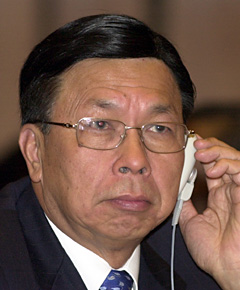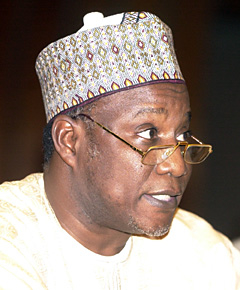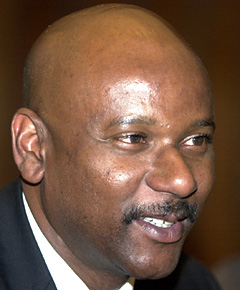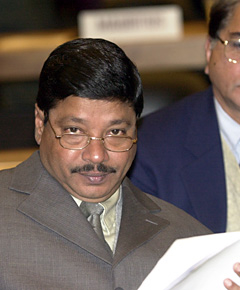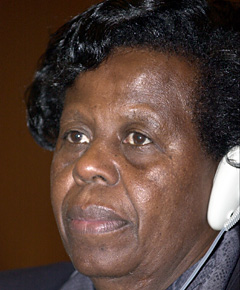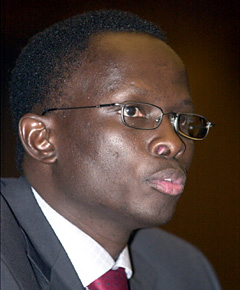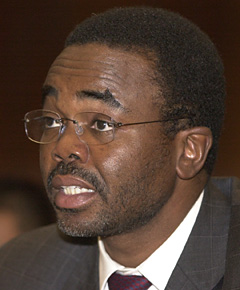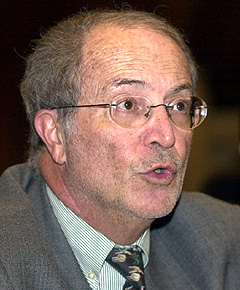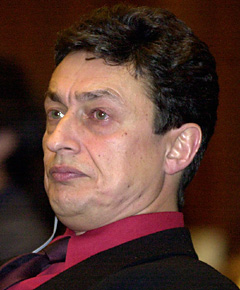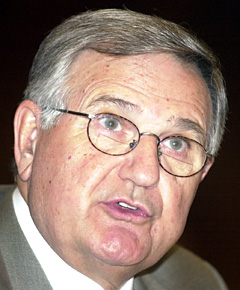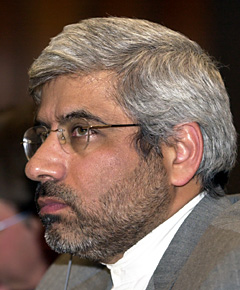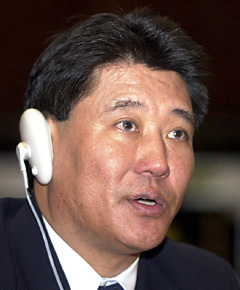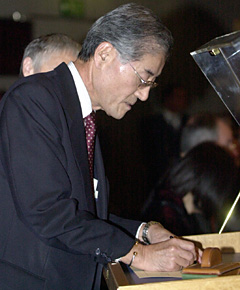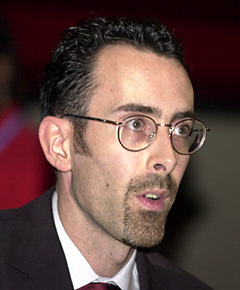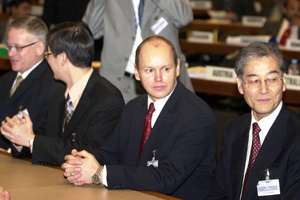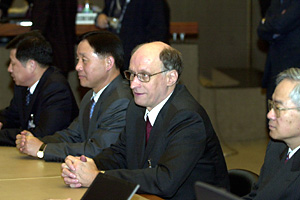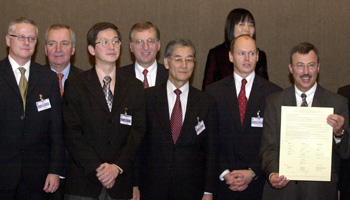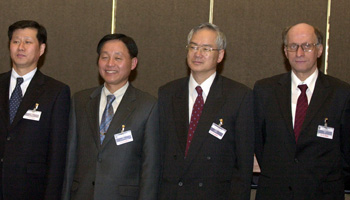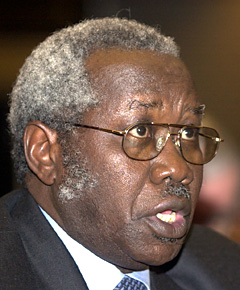|
Thursday, 12 December 2002
The high-level segment of COP-6 began on Thursday with opening addresses and statements from 31 government representatives, including 12 ministers. Parties also adopted a decision on a compliance mechanism. Working Groups and sub-groups on the Strategic Plan, the budget and institutional arrangements reconvened to complete their work.
HIGH-LEVEL SEGMENT
OPENING ADDRESSES: COP-6 President Jelev opened the high-level segment of COP-6. Observing that the Basel Convention has made great progress in the decade since its entry into force, he thanked UNEP Executive Director Klaus Töpfer and COP-5 President Phillipe Roch for helping guide the Convention, and the Secretariat for its ongoing work. He noted significant progress during the first three days of COP-6, and said he was confident that agreements could be reached on the few outstanding issues.
Klaus Töpfer described the Basel Convention as a key instrument for creating a cleaner world. Noting that COP-6 will take major decisions on the future direction of the Convention, he drew attention to work on the Strategic Plan and the legal establishment of Basel Convention Regional Centers (BCRCs), and described Wednesday's agreement on a compliance mechanism as "ground breaking." He urged Parties to ratify the Ban Amendment and the Protocol on Liability and Compensation, highlighted the public-private sector initiative on mobile phones as a significant achievement and emphasized cooperation and dialogue with civil society. He noted that the Plan of Implementation agreed at the World Summit on Sustainable Development (WSSD) addresses the issue of chemicals and hazardous wastes and that the upcoming session of UNEP's Governing Council will consider how to implement the Plan.
 Listen to Klaus Töpfer Listen to Klaus Töpfer
COP-5 President Philippe Roch, State Secretary, Director of the Swiss Agency for the Environment, Forests and Landscape, said the WSSD highlighted the need for a global strategy on chemicals and close cooperation among MEAs. He stressed the importance of partnerships, and said the mobile phone initiative demonstrates that companies are assuming responsibility for the entire life cycle of the product.
 Listen to Philippe Roch (in French) Listen to Philippe Roch (in French)
COUNTRY STATEMENTS: Following the opening addresses, delegates heard statements from ministers and heads of delegations. The following section summarizes the key themes addressed in these statements.
Ban Amendment: TANZANIA, MALAYSIA and several other speakers urged countries to ratify the Ban Amendment. DENMARK, speaking for the EU, called on Parties to ratify the Amendment so that entry into force could be achieved, preferably before COP-7. KENYA announced that it is preparing to ratify the Amendment and POLAND announced that it had completed the procedure for ratifying the Amendment.
 Listen to Denmark Listen to Denmark
 Listen to Tanzania Listen to Tanzania
Capacity building and technology transfer: Many developing countries called for increased capacity building, technology transfer and financial assistance to support implementation of the Convention and the Ban Amendment. POLAND urged assistance for countries with economies in transition in meeting implementation costs. NIGER said capacity building for developing countries is indispensable for ensuring implementation of the Convention. PAKISTAN noted its insufficient technical capacity to deal with accumulated pesticides and other chemical wastes and drew attention to environmental damage caused by the illegal dumping of hazardous waste at sea. As a least developed country, BHUTAN underscored its lack of expertise and financial resources and called for meaningful technological cooperation to develop its institutional capacity.
Compliance mechanism: The EU and CANADA expressed satisfaction at the compromise package agreed on compliance and POLAND said the mechanism should better discipline Parties in meeting their commitments. PERU said adequate resources must be made available to ensure the effectiveness of the compliance mechanism.
Convention implementation: CROATIA and PERU stressed the principle of common but differentiated responsibility among Parties in the implementation of the Basel Convention. BOTSWANA underscored the ineffectiveness of legislation without enforcement.
Cooperation and synergies: Many Parties, including MAURITIUS, SENEGAL, CANADA and LUXEMBOURG, called for enhanced synergies and coordination of chemicals-related MEAs. SOUTH AFRICA urged the Basel Secretariat to initiate dialogue to develop joint programmes with the African Ministerial Conference on the Environment (AMCEN) and the New Partnership for Africa's Development (NEPAD).
 Listen to Mauritius Listen to Mauritius
National and regional policies and activities: Many African countries, including SENEGAL and MOZAMBIQUE, called attention to the Rabat Declaration and urged efforts to ensure the implementation of its Plan. SOUTH AFRICA called for donors to support national and regional activities aimed at environmentally sound management of hazardous waste. BENIN stressed that the Basel Convention needs a similar level of resources to other MEAs. He questioned how private companies will exercise responsibility over end-of-life products exported to Africa, and called attention to an upcoming subregional workshop on this matter. BANGLADESH highlighted its national ban on the production, marketing and use of polyethylene shopping bags. BHUTAN noted that it has taken steps to avoid becoming a dumping ground for hazardous waste.
Partnerships: Several speakers, including MALAYSIA and MAURITIUS, supported partnerships with industry. CROATIA, INDONESIA and others emphasized the importance of partnerships with IGOs and NGOs. MONACO stressed that sustainable development is only possible when civil society and the private sector are fully involved. CANADA and others welcomed the mobile phone initiative.
Regional Centers: Many countries supported the legal establishment of the BCRCs and called for stable funding for strengthening the Centers. CHINA identified financial restrictions and a lack of capacity as constraints for BCRCs. UGANDA underscored the urgent need to transform the African BCRCs into primary providers of capacity building in hazardous waste detection, management and disposal. URUGUAY, on behalf of GRULAC, welcomed the critical role given to the BCRCs in the draft Strategic Plan and urged donor countries to reaffirm their strong commitment and support for BCRCs.
 Listen to Uganda Listen to Uganda
Strategic Plan: Many speakers, including the EU, INDONESIA and JORDAN, highlighted the importance of the Strategic Plan, and the role of BCRCs in supporting its implementation. KUWAIT urged implementation of the Plan. MALAYSIA welcomed the identification of short, medium, and long-term activities and prioritized achievable targets. JAPAN supported efforts to develop countries' capacities to implement the Strategic Plan, and urged other donors to follow suit.
 Listen to Malaysia Listen to Malaysia
Waste minimization: Many speakers, including CHINA and MAURITIUS, stressed the importance of minimizing hazardous waste generation. GRULAC called for the prioritization of hazardous waste minimization in the Strategic Plan. JAPAN supported strategies for waste reduction, reuse and recycling. TANZANIA, MAURITIUS, BOTSWANA and THAILAND highlighted the importance of cleaner production practices in industry.
World Summit on Sustainable Development: GRULAC drew delegates' attention to the WSSD Plan of Implementation, which recognizes linkages between the management and elimination of hazardous wastes, and the effects on human health and sustainable development. The EU supported follow-up to the WSSD. SOUTH AFRICA, BANGLADESH and others urged the Basel Secretariat to work with the Commission on Sustainable Development (CSD) and other IGOs in implementing the chemicals-related outcomes of the WSSD.
Other topics: SLOVAKIA expressed hope that the Protocol on Liability and Compensation would soon enter into force. UGANDA called for greater political recognition of the Basel Convention. GRULAC urged improved interpretation and translation services at Subsidiary Body meetings. MAURITIUS highlighted the special needs of small island developing States with respect to hazardous waste management, due to their geographic location, small size, and dependence on imported products. TANZANIA emphasized that national inventories are crucial for managing hazardous waste, setting priorities and assessing risks. BOTSWANA highlighted the importance of the polluter pays principle.
 Listen to Slovakia Listen to Slovakia
 Listen to Nigeria (taken from the high-level segment) Listen to Nigeria (taken from the high-level segment)
SIGNING CEREMONY: Delegates witnessed a signing ceremony for a partnership on the environmentally sound management of end-of-life mobile phones. The partnership involves the Basel Convention, UNEP, the Government of Switzerland, and many of the world's major mobile phone manufacturers, including LJ, Matsushita (Panasonic), Mitsubishi Electric, Motorola, NEC, Nokia, Philips, Samsung, Siemens, and Sony Ericsson.
COMPLIANCE: Compliance Working Group Chair Alistair McGlone reported to Plenary that, after several years' work on this issue, negotiations during the past few days in the Working Group and a sub-group had resulted in an agreed text. Many Parties thanked Chair McGlone for his skillful handling of these negotiations. JAPAN expressed pleasure at the inclusion of language on prior notice and consultation. CANADA described the agreement as a good outcome that will benefit all Parties. AUSTRALIA said a "fair compromise" had been achieved. The NETHERLANDS joined the consensus, but noted that he would have preferred a "stronger and broader mechanism" and that he did not consider it a precedent for other agreements. The document was adopted by acclamation.
WORKING GROUPS
BUDGET AND INSTITUTIONAL ARRANGEMENTS: The Working Group continued its review of the budget and examined the draft work programme of the proposed new Open-Ended Working Group (OEWG) Subsidiary Body. Regarding the draft decision on institutional arrangements, progress was made concerning the composition and roles of the Expanded Bureau and the OEWG. Text was negotiated stipulating that Expanded Bureau members must consult with and report to other Parties in their regions before and after meetings and that decisions on the admittance of observers to meetings will be left to the Expanded Bureau itself. Parties agreed that the Expanded Bureau will only have administrative duties and that its financial powers will be limited to the approved budget. Discussions were also held on the expertise and regional representation of the co-chairs of the OEWG, its mandate, and the admittance of Parties and observers to OEWG meetings. A tentative schedule of OEWG meetings for 2003-2004 was also discussed.
In the evening, debate continued on interpretation and translation services in all six UN languages at OEWG meetings, and financing to support this. At the request of CHINA, a paragraph was added inviting Parties to submit comments to the Secretariat in 2004 on the functioning of the new institutional arrangements. Discussions continued into the night on the draft decisions on institutional arrangements and on financial matters.
STRATEGIC PLAN: Delegates concluded discussions and approved a draft decision on the Strategic Plan. They also endorsed a draft decision on selection and funding of 2003-2004 activities, including an appendix outlining the criteria for selection of projects for implementation of the Basel Declaration through the Strategic Plan.
During the morning session, Co-Chair Thompson recommended adopting the Action Table on the basis that it is a first edition that can be improved upon. Following general comments, delegates reconvened in the afternoon to discuss a Co-Chair's revised draft decision on the Strategic Plan. Debates centered on whether COP-6 should adopt the Plan as a whole, or just adopt the text and the Action Table for 2003-2004, leaving activities for 2005-2010 to be decided by COP-7. GERMANY expressed concern that the Action Table is not sufficiently comprehensive and stressed the need for its further review and amendment at COP-7. After a lengthy debate, delegates approved a compromise text that adopts the Plan as a whole and requests the appropriate Subsidiary Body to review and amend the Action Table and submit it based on the review to COP-7.
The contact group on criteria presented its paper on criteria for the selection of projects for implementation of the Basel Declaration through the Strategic Plan. Co-Chair Thompson stated that the criteria would be used to allocate funding from the budget approved at this COP to projects implementing the Plan. Delegates discussed the subjectivity of criteria, commonality of the projects, and the need to distribute projects and funds equally among regions. In an evening session, delegates discussed a draft decision authorizing the Secretariat to use the criteria in selecting projects, and agreed to forward it to the Budget Working Group.
Negotiations on a draft decision on the Basel Declaration continued late into Thursday night.
|
|

